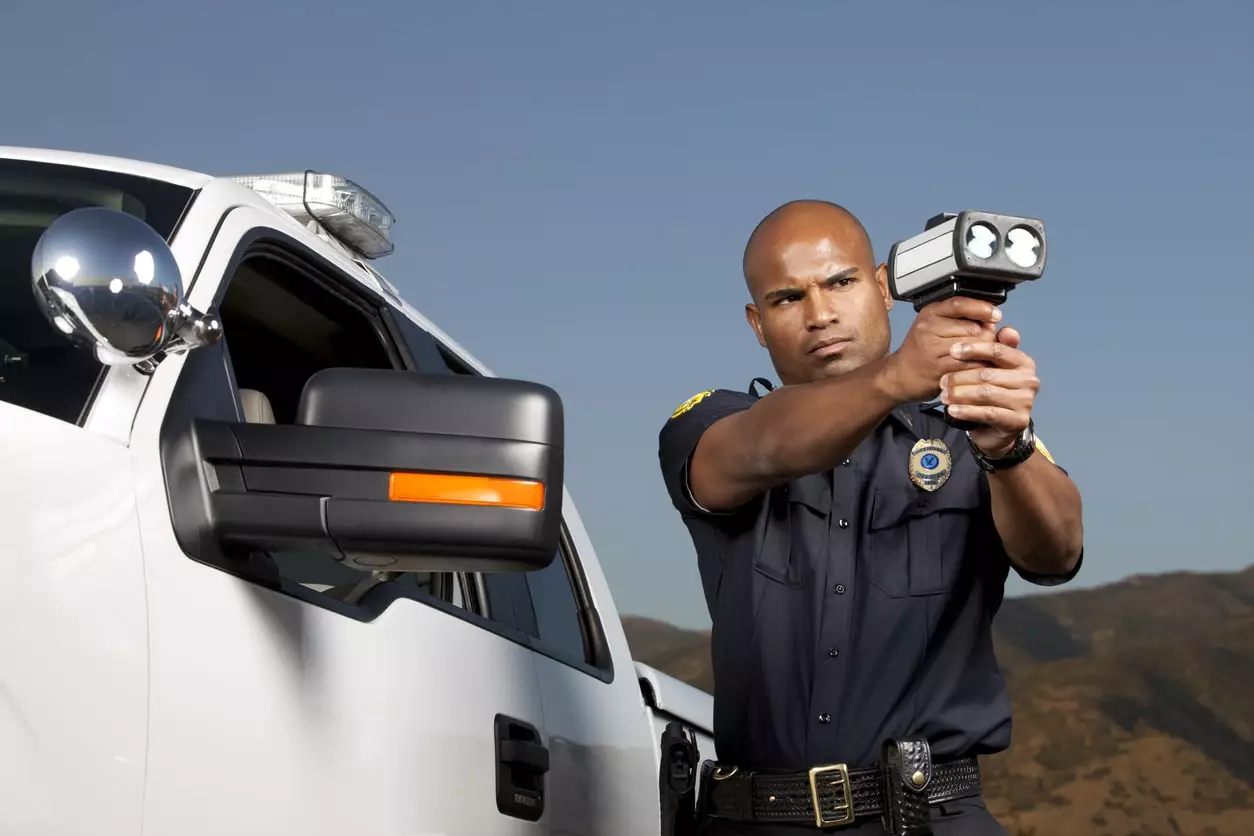 What Is a License Plate Reader and Can Police Track You Using It?
What Is a License Plate Reader and Can Police Track You Using It?
Table of Contents
- West Virginia License Plate
- West Virginia License Plate Design and Formats
- West Virginia Vanity License Plates
- Most Popular West Virginia Special Plate Numbers
- West Virginia License Plate Lookup
- What Do I Need to Get a License Plate in West Virginia?
- Differences Between a Passenger License Plate and Commercial License Plate in West Virginia
- How To Renew License Plate in West Virginia
- How To Transfer a License Plate in West Virginia
- West Virginia License Plate Lookup Frequently Asked Questions (FAQ)
 West Virginia License Plate
West Virginia License Plate
West Virginia license plates are metal plates attached to vehicles registered within the state showing their registration/license numbers, which are official identifications of the vehicles. They are issued by the state's Department of Transportation (DOT) through the Division of Motor Vehicles (DMV). All motor vehicles in West Virginia, including motorcycles, pole trailers, trailers, semi-trailers, and recreational vehicles (RVs) driven on a highway, must be titled and registered with the DOT. Once registered, a vehicle owner will receive a license plate and a registration card. A typical West Virginia license plate includes the state's name and the plate serial number (plate number), which consists of a combination of numbers, letters, characters, or symbols in an arrangement determined by the DMV.
Per Section 17A-3-15 of the West Virginia Code, a vehicle's license plates must be attached to the rear of the vehicle. Exceptions include road tractors and truck tractors, which are designed and constructed to pull semi-trailers and trailers. License plates issued to these vehicle types must be displayed on the front of the vehicles.
The major types of license plates in West Virginia include the following:
- Standard License Plates - These are the kinds of plates issued by default to vehicle owners after registration
- Specialty License Plates - Specialty license plates allow vehicle owners to express their hobbies, passions, or support for certain interests or causes. The West Virginia DMV offers vehicle owners a range of special license plate designs (over 200) representing several interests, organizations, and causes. They are broadly categorized as Associations and Organizations plates, General Interest plates, Military plates, and Colleges and Universities plates
- Personalized License Plates - These plates offer vehicle owners the opportunity to express their personalities by selecting their preferred unique plate numbers
- Disability License Plates - These are primarily issued to vehicle owners with physical disabilities in the state
Per state law, every license plate issued by the West Virginia Division of Motor Vehicles (DMV) must be securely attached horizontally to the vehicle to which it is registered. The height between the license plate (measured from the bottom) and the ground must be at least 12 inches. A West Virginia license plate must be fastened in a position where it will be visible and the plate number readable from 100 feet away during the day.
 West Virginia License Plate Design and Formats
West Virginia License Plate Design and Formats
The West Virginia DMV issues several types of license plates with varying designs and color themes, depending on the plate type. However, all of these license plates have one thing in common - the state's name, West Virginia, is written boldly on the top of the plates. Most specialty license plates contain logos and designs representing the special interests and causes they are designed to support. In 2023, the state's DMV launched a new design featuring a West Virginia State outline in the center and a seven-digit plate number on every plate. This design is now the state's new Standard Class A Motor Vehicle License Plate.
The first digit of the new West Virginia standard license plate design indicates the month of issuance. Most of the plate background is white and has a blue band at the top, which accommodates the state's name written in gold color. The plate also has the word "Wild Wonderful" written on the bottom.
Standard License Plates
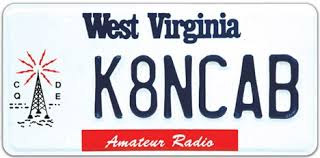
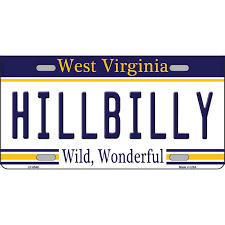
Specialty and Personalized License Plates
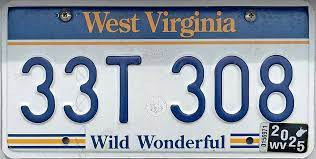
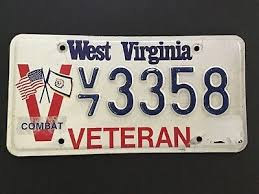
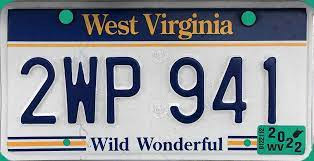
 West Virginia Vanity License Plates
West Virginia Vanity License Plates
Vanity license plates are known as personalized license plates in West Virginia. These are plates with customized special messages (plate numbers) imprinted. In West Virginia, personalized plates are issued for Class A vehicles only. These include motorcycles, automobiles, and trucks weighing at most 10,000 lbs. You must first title your vehicle and obtain a regular Class A plate for it before you can secure a vanity license plate in the state.
The first thing you must do before applying for a West Virginia vanity license plate is to confirm the availability of your choice message or license plate number. The DMV prohibits using offensive or obscene messages and will deny any choice it considers as such. While making a choice, you may select up to five characters for a Patriotic plate, eight for a Scenic or Standard plate, and six for a Motorcycle, 9-11, or Wildlife plate. Punctuation marks, numbers 1 to 2000, and symbols are not permitted, and the minimum number of characters allowed is two.
The West Virginia DMV provides a Personalized Plate Request service that allows interested persons to request vanity/personalized plates online. You will need your vehicle's title number and current plate number to initiate the request. Follow the system prompts and pay the required fees before submitting your request. Alternatively, you can request a West Virginia personalized plate by mailing a completed Application for a Personalized License Plate Form to the DMV at:
West Virginia Division of Motor VehiclesSpecial Plates
P.O. Box 17120
Charleston, WV 25317
If your plate number choice is not offensive and does not conflict with regular series number plates, the DMV will review and approve it, provided the application is complete. Your vanity license plate will be delivered within 60 days. Return your current license plate and registration card to the DMV within 10 days of receiving your personalized license plate.
 Most Popular West Virginia Special Plate Numbers
Most Popular West Virginia Special Plate Numbers
The most common special license plates in West Virginia include the following:
- FireFighter license plate
- Rotary International license plate
- Knights of Columbus license plate
- Bowler license plate
- Amateur Radio license plate
- Fraternal Order of Police license plate
- West Virginia State College license plate
- American Legion license plate
- Air Force Cross license plate
- Coast Guard Reserves license plate
- Gold Star Family license plate
- Purple Heart license plate
- Pearl Harbor Survivor license plate
- Vietnam War Veteran license plate
- Bronze Star license plate
- Emergency Medical Services license plate
- Lions International license plate
- Volunteer Firefighter license plate
- 911-Enhanced Council license plate
 West Virginia License Plate Lookup
West Virginia License Plate Lookup
A West Virginia license plate lookup involves using the plate number of a vehicle registered in the state to access other details about that vehicle. Several license plate lookup websites can provide basic information about vehicles. License plate lookup is useful, and in West Virginia, you may want to look up a license plate issued by the state's DMV for many reasons. For example, if you intend to purchase a used vehicle, searching its license plate will help you determine if it is a stolen car. With the assistance of law enforcement, you may be able to find a hit-and-run driver if you get involved in an accident. License plate lookups in West Virginia can help the police while investigating crimes.
Generally, a West Virginia license plate lookup can reveal information such as a vehicle's make, year, model, engine capacity, mileage, and body style. It can also fetch a vehicle inspection number (VIN) and determine whether a vehicle has been reported and listed as stolen. Qualified persons or entities can search for vehicle information at a fee in West Virginia through the Request for Vehicle Information Portal provided by the DMV. Similarly, with a license plate number, you can look up certain information on any West Virginia-registered vehicle using RecordsFinder, a legitimate and reliable license plate lookup website.
West Virginia Reverse License Plate Number Search
With Recordsfinder, you can do a reverse license plate number lookup on a West Virginia-registered vehicle using the vehicle's full license plate number. This search will return information about the vehicle associated with the plate.
 What Do I Need to Get a License Plate in West Virginia?
What Do I Need to Get a License Plate in West Virginia?
You must register your vehicle in West Virginia to get a license plate from the state's Division of Motor Vehicles (DMV). Registering a vehicle in West Virginia depends on whether it is purchased as new or used. However, to register a vehicle in the state, a person will generally need the following:
- A completed Application for Certificate of Title Form
- Valid proof of identity, such as a driver's license or any other valid state-issued ID
- Proof of West Virginia residency
- Proof of vehicle ownership (Notarized bills of sale, title, or manufacturer's certificate of origin
- Proof of insurance
- Payment of the required fees, including taxes
To register a used vehicle in West Virginia, visit the nearest local DMV office to submit the required documents and a completed Odometer Disclosure Statement Form with the required payment. Dealerships mostly handle vehicle registrations for newly purchased cars in the state. However, vehicle owners provide their valid IDs and proof of insurance while the dealerships take care of the rest.
West Virginia requires new residents to have their vehicles titled and registered with the DMV within 30 days of establishing residency before they can obtain license plates. The name on an out-of-state title of such a vehicle must be the same as the applicant's name. Other requirements for registering an out-of-state vehicle and getting a West Virginia license plate include the following:
- Proof of titling that vehicle in the previous state of residence. The title must have an out-of-state address
- Evidence that the vehicle owner was not a West Virginia resident when they acquired their vehicle. The out-of-state vehicle carrying their name and an out-of-state address is enough proof
- Proof of establishing residency in West Virginia
If you have recently moved permanently to West Virginia from another state and you meet these requirements, you can title and register your vehicle in the state. To do this, submit your out-of-state vehicle title and a completed West Virginia Application for Certificate of Title Form at the nearest local DMV office. You will also need to submit proof of insurance and a completed Odometer Disclosure Statement Form. Upon completion of the registration process and approval, the DMV will issue a single license plate to the vehicle owner.
 Differences Between a Passenger License Plate and Commercial License Plate in West Virginia
Differences Between a Passenger License Plate and Commercial License Plate in West Virginia
Passenger license plates are issued to vehicles that are mainly used for personal or non-commercial purposes. On the other hand, commercial plates are given to vehicles used for business purposes. West Virginia has motor vehicle classifications that are different from most states and classifies them as Class A, B, C, G, H, J, M, R, T, V, and X. The major differences between a commercial license plate and a passenger license plate in the state are summarized in the table below:
| Features | Passenger License Plate | Commercial License Plate |
|---|---|---|
| Vehicle type | Issued for cars, pickup trucks, and motorhome chassis used mainly for personal or family purposes |
Issued to vehicles that meet any of the following criteria:
|
| Cost | Usually cheaper than commercial plates and is mostly included in the vehicle registration fee | Typically higher than the cost of obtaining a passenger license plate |
 How To Renew License Plate in West Virginia
How To Renew License Plate in West Virginia
Vehicle registrations (license plates) last 12 months in West Virginia and must be renewed before expiring. Typically, the state's Division of Motor Vehicles (DMV) mails renewal reminder postcards to vehicle owners at least 30 days before the current registrations expire. West Virginia license plates can be renewed online, in person, or by mail.
To renew your West Virginia license plate by mail, complete the Registration Renewal Notice (DMV-44) and send it with your personal property tax receipt, insurance information, and payment to the DMV at:
West Virginia Division of Motor VehiclesP.O. Box 17110
Charleston, WV 25317 If you opt to renew your vehicle registration in person, visit any of the local DMV offices with your personal property tax receipt, insurance information, and payment. An employee at the DMV office will assist you. For online West Virginia vehicle registration renewal, use the DMV Online Services. You will need your vehicle's title number and license plate number to initiate the request. Afterward, you must provide the required details on your personal property taxes and insurance. In addition, you must have a valid credit card handy to make the required payment.
Furthermore, if your county's Sheriff processes vehicle registration renewals, you can visit your County Sheriff's office and apply for a West Virginia license plate renewal. Note that only motorcycle registrations (Class G) and passenger vehicle registrations (Class A) can be renewed at a Sheriff's office in the state. You will need to provide all the required information, including your registration renewal notice, personal property tax, and insurance details.
 How To Transfer a License Plate in West Virginia
How To Transfer a License Plate in West Virginia
The state's Division of Motor Vehicles (DMV) allows vehicle owners in West Virginia to transfer their license plates from one vehicle to another motor vehicle of the same class. This is usually done when someone sells their car and wishes to stick to their old license plate. To transfer your West Virginia license plate to a newly acquired vehicle, complete an Application for Transfer of a License Plate Form (DMV-44-A-TR) with all the required information and mail it to the DMV at:
West Virginia Department of TransportationDivision of Motor Vehicles
P.O. Box 17710
Charleston, WV 25317
Note that both vehicles must be titled in your name to be able to transfer your license plate from your old vehicle to the new one in West Virginia. This service costs $10.50 and is payable to the Division of Motor Vehicles by check or money order.
 West Virginia License Plate Lookup Frequently Asked Questions (FAQ)
West Virginia License Plate Lookup Frequently Asked Questions (FAQ)
Can I Get a Replacement for My Lost License Plate in West Virginia?
Yes, getting a replacement for your lost license plate in West Virginia is possible. First, inform the state's police that your license plate was lost and obtain a police report for safety purposes. Afterward, you can request a replacement from the West Virginia Division of Motor Vehicles (DMV). The DMV accepts applications for license plate replacement through its Online Services. Alternatively, you can obtain a replacement West Virginia license plate by mailing a completed Request for a Replacement Registration Card, License Plate Decal, or License Plate Form Form DMV-32-TR) to the DMV. However, you will not get the same plate number once it is reported to law enforcement as stolen. This is because it may continue to show up as stolen if law enforcement runs a check on it. You can also request a replacement plate for a West Virginia personalized license plate by mailing a completed Application for Issuance of a Replica License Plate Form (Form DMV-43-TR) to the DMV.
What Do Police See When They Run Your License Plates in West Virginia?
Law enforcement officers, including police officers, can see the following information when they run a plate check on your West Virginia license plate:
- Vehicle information, including license expiry date, VIN (vehicle identification number), make, year, and model
- Owner's information, including name, address, and date of birth
- Driver's criminal history
- Outstanding warrants
- Whether the vehicle has been reported to be involved in a crime
- If the car or license plate was reported as stolen
What is the Penalty for Driving with An Expired License Plate in West Virginia?
West Virginia license plates/vehicle registrations expire 12 months after issuance and must be renewed annually. There is a 30-day grace period for expired vehicle registrations in the state. While the DMV sends registration renewal notices about 30 days before vehicle registrations expire, a vehicle owner must know when their registration expires and renew it before the due date. The DMV charges a $10 fee in addition to the vehicle registration renewal fee as a penalty for late renewal. Operating a motor vehicle with an expired license plate in West Virginia is a misdemeanor. If convicted, an offender risks being fined and may be confined to jail for about six months. This punishment also applies to anyone driving with an expired temporary vehicle registration in the state.
Do I Need to Return License Plates in West Virginia?
It depends. You may keep your West Virginia license plate if you sold your old vehicle, provided you have proof of plate transfer to another vehicle owned by you and evidence of insurance on the new vehicle. Otherwise, you may submit the license plate and a completed Sold Vehicle or Watercraft Notice Form to the state's DMV. If you have a vehicle with a valid registration that becomes inoperative for any reason, you must keep the insurance valid if you intend to keep the license plate still. However, you must return your license plates to the West Virginia DMV if you move permanently out of state or cancel your insurance. If you are required for any reason to return your license plate and it has been lost, complete the Vehicle Registration Plate Surrender Form to the state's DMV.
Can I Keep my West Virginia License Plate if I Move to Another State?
No. The West Virginia Division of Motor Vehicles requires you to return your vehicle license plate if you relocate permanently to another state. Generally, unless expressly permitted by state law, it is illegal to keep the license plate of a state when you move to another state. In West Virginia, you could have your license plate canceled if you fail to return it after moving out of the state.
What Size are License Plates in West Virginia?
Typical West Virginia license plates measure 12" x 6".
How Long Can You Drive with Temporary License Plates in West Virginia?
The validity duration of a West Virginia temporary license plate/registration is determined by the state's Division of Motor Vehicles (DMV). A temporary license plate is usually issued to permit a vehicle whose owner has applied for titling and/or registration to operate on the highways and streets pending the delivery of their permanent vehicle registration/license plate. Per Section 17A-6C-11 of the West Virginia Code, a temporary license plate in the state expires if any of the following happens, whichever occurs first:
- Upon the receipt of a permanent license plate
- Upon the expiration of 90 days from the issued date
- If a person cancels the contract to purchase the motor vehicle on the temporary registration was issued
What Are the Steps to Renew License Plates in West Virginia?
A West Virginia license plate can be renewed with the state's Division of Motor Vehicles in any of the following ways:
- Online
- Open the DMV Online Services and select the Online Vehicle Registration renewal tab
- Enter your license plate number and the vehicle's title number, and then submit the form
- Provide all required information on your personal property taxes and insurance
- Pay the required renewal application fee with a credit card and complete the application
- In Person
- Visit any local DMV office with your registration renewal notice
- Upon reaching the DMV office, provide all the required information, including your personal property tax receipt and insurance information
- Pay the required renewal application fee
- By Mail
- Package your registration renewal notice with your personal property tax receipt, insurance information, and payment in an envelope and mail the envelope to the DMV at:
P.O. Box 17110
Charleston, WV 25317
What Do I Do if My License Plate is Lost or Stolen in West Virginia?
- Immediately report the theft or loss to the West Virginia State Police
- Request a replacement license plate using the DMV Online Services and provide all the required information. Alternatively, complete the Form DMV-32-TR (Request for a Replacement Registration Card, License Plate Decal, or License Plate Form) or Form DMV-43-TR or a personalized plate and mail it to the DMV at:
Vehicle Services
P.O. Box 17110
Charleston, WV 25317
Note that you will not get the same plate number once you report a license plate as stolen. If the DMV replaces your license plate with one that matches a plate previously reported as stolen or lost, it will continue to show up as stolen when run by law enforcement. In this case, the DMV will issue you a letter stating that the license plate is valid, but you must keep this letter in the vehicle always.




